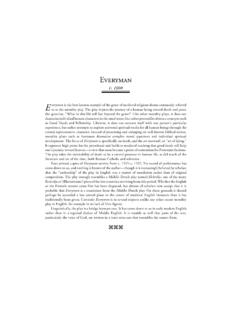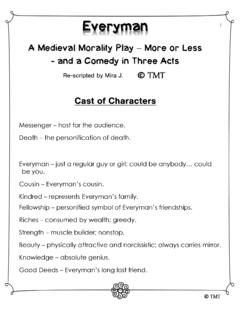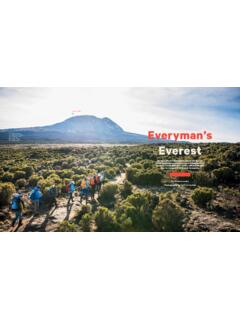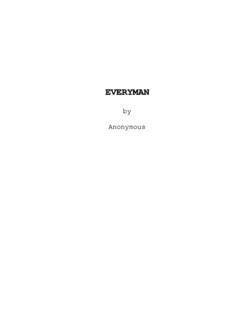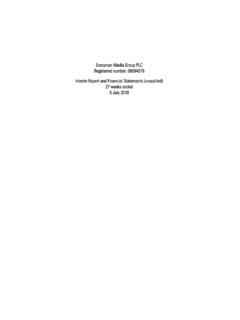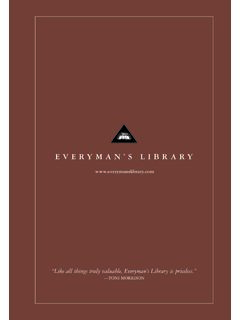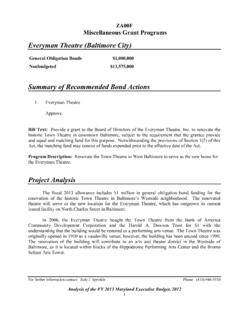Transcription of Not Just Every Man: Revisiting the Journalist's Privilege ...
1 Not Just " Every Man": Revisiting the Journalist's PrivilegeAgainst compelled Disclosure of confidential SourcesJAIME M. PORTER*"A popular government without popular information, or the means ofacquiring it, is but a prologue to a farce or tragedy; or perhaps both."'INTRODUCTIONIn its pursuit of truth and justice, the American judicial system has long relied onthe principle that the public "has a right to Every man's evidence."2 To this end, courtsrely on a strong presumption against recognizing evidentiary privileges. Thispresumption, however, is not absolute; rather, throughout the years, the law hasrecognized that disclosures made within the confines of certain relationships should beprivileged. While evidentiary privileges have been recognized since as early as thesecond century, ,3 and well-established privileges exist for attorney-client,4psychotherapist-patient , clergy-penitent,6 and spousal communications,' a modemmovement is underway to provide an evidentiary Privilege for yet another set ofcommunications: those between journalists and their sources.
2 * Candidate, Indiana University School of Law-Bloomington, 2007; ,University of Michigan, 2002. I would like to thank my parents, Jim and Gail Porter, for theirsupport and encouragement, and for the many hours spent reading and critiquing my writingover the years. A special thank you is owed to my grandfather, Hon. James M. Porter, forinspiring me to become a Letter from James Madison to Barry (Aug. 4, 1822), in THE FOUNDERS'CoNsTrruToN 690 (Philip B. Kurland & Ralph Lerner eds., 1987).2. United States v. Bryan, 339 323, 331 (1950) (quoting 7 J. WIGMORE, EVIDENCE 2192 (McNaughton rev. 1961)).3. Marshall Williams, The Scope of the Corporate Attorney-Client Privilege in View ofReason and Experience, 25 How. 425, 426 (1982). "The Roman law of slavery in effectgave rise to the predecessor of the attorney-client Privilege ." "The attorney-client Privilege is the oldest of the privileges for confidentialcommunications known to the common law." Upjohn Co.
3 V. , 449 383, 389 (1981)(citing 8 J. WIGMORE, EVIDENCE 2290 (McNaughton rev. 1961)).5. See discussion of Jaffee v. Redmond, 518 1 (1996), infra Part The clergy-penitent Privilege is considered one of the three professional privilegesrecognized in federal courts (the other two being the psychotherapist-patient and attorney-clientprivileges). GEORGE FISHER, EVIDENCE 756 (2002). For a discussion of the clergy-penitentprivilege, see, , In re Grand Jury Investigation, 918 374 (3d. Cir. 1990); Morales , 154 F. 706 ( 2001).7. See, , United States v. Rakes, 136 1, 3 (1 st Cir. 1998) (stating that the maritalcommunications Privilege "permits an individual to refuse to testify, and to prevent a spouse orformer spouse from testifying, as to any confidential communication made by the individual tothe spouse during their marriage").INDIANA LAW JOURNALIt is undisputed that journalists must sometimes rely on confidential sources,8 and itis also clear that the press, as an institution, serves a vital function in our In order to keep the public informed, the press must be unimpeded ingathering information; yet, the legal protection afforded to the press for maintaining theconfidentiality of its sources remains nebulous.
4 The Supreme Court addressedconfidential sources in Branzburg v. Hayes, holding that compelling journalists todisclose the identities of such sources before grand juries does not abridge thefreedoms of speech and press guaranteed by the First Amendment.'0 Despite theSupreme Court's ruling, many federal courts have nonetheless recognized a privilegeagainst disclosure of sources in the grand jury setting." Many states have alsocounteracted the Supreme Court's Branzburg ruling by passing shield laws to Privilege established by federal courts and state legislatures, however, isinconsistent at best. In addition, there is an emerging trend towards narrowing theprivilege.'2 The Journalist's Privilege gained particular notoriety from the highlypublicized incarceration of former New York Times reporter Judith Miller for herrefusal to comply with a court order compelling disclosure of the source who revealedcovert CIA agent Valerie Plame's identity.
5 '3 While this case incited national debate8. Walter Cronkite has stated that "in doing my work, I ..depend constantly oninformation, ideas, leads and opinions received in confidence. Such material is essential indigging out newsworthy facts and, equally important, in assessing the importance and analyzingthe significance of public events." Branzburg v. Hayes, 408 665, 730 (1972). JournalistJames Taricani, who was held in contempt for not revealing sources, has also expressed thenecessity of confidentiality: "I wish all my sources could be on the record, but when people areafraid, a promise of confidentiality may be the only way to get the information to the public, andin some cases, to protect the well-being of the source." Pam Belluck, Reporter is Found Guiltyfor Refusal to Name Source, TIMES, Nov. 19, 2004, at Chief Justice Burger called journalists "surrogates for the public," referring to thenecessity of the media for disseminating information about trials to the public.
6 RichmondNewspapers, Inc. v. Virginia, 448 555, 572-73 (1980).10. 408 665, When finding that a Privilege exists, many courts have relied on Justice Powell'sBranzburg concurrence. See infra Part The United States fell more than twenty places in the Reporters Without Borders 2005 World Press Freedom Index. The organization attributed this occurrence to "the imprisonmentof New York Times reporter Judith Miller and judicial action that is undermining the privacy ofjournalistic sources," particularly the increased boldness of federal courts in subpoenaingreporters to disclose confidential sources. Reporters Without Borders, The 2005 World PressFreedom Index, Oct. 20,2005, at 2, available at (last visited Feb. 26, 2007).13. The Miller controversy began in 2003, when journalist Robert Novak published thename of covert CIA agent Valerie Plame Wilson. See, , Nicholas Lemann, Telling Secrets:How a Leak Became a Scandal, THE NEW YORKER, Nov. 7, 2005.
7 A special prosecutor, PatrickFitzgerald, was appointed to investigate the potential violation of The Intelligence IdentitiesProtection Act of 1982, 50 421 (1982), which criminalizes revealing the identity of aCIA agent. Id. While Miller investigated the Plame story, she never published an article about Nevertheless, she was subpoenaed by Fitzgerald to testify in front of a grand juryinvestigating the leak. When Miller refused to cooperate, she was held in contempt of court bythe District Court; the Circuit Court of Appeals upheld the decision, and the Supreme[Vol. 82:549 Revisiting THE JOURNALISTS' Privilege over the legal soundness of the Privilege , the subpoenaing ofjournalists to testify abouttheir confidential sources is not anomalous in the realm ofjournalism. Media lawyersreport that there has been a recent increase in the number of subpoenas being issued tojournalists, and that "the legal climate for those seeking to protect confidential sourcesis turning chillier.]
8 ,14 In addition to a spate of cases in the Circuit (the Miller andrelated Matthew Cooper cases,15 as well as the Wen Ho Lee case6), a number of otherfederal courts, including the First, Fifth, and Seventh Circuits, have recently deniedCourt denied certiorari. See In re Special Counsel Investigation, 332 F. 26 ( ); In re Grand Jury Subpoena, Judith Miller, 397 964 ( Cir. 2005), cert. denied,545 1150 (2005). In sum, Miller was denied protection against revealing her sources; sheultimately served eighty-five days in a federal prison for refusing to do so. See, , JeffreyToobin, Name that Source, THE NEW YORKER, Jan. 16, 2006, at 30. The irony of the Miller storyis that Fitzgerald knew the leaker's identity (it was Richard Armitage, a former deputy secretaryof state under Colin Powell) from "his very first day in the special counsel's chair." DavidJohnston, Leak Revelation Leaves Questions, TIMES, Sept. 2, 2006, at Katherine Q. Seeyle, Journalists Say Threat of Subpoena Intensifies, TIMES, July4, 2005, at Cl.
9 Because there is no database to track how many subpoenas have been issued toreporters, it is difficult to quantify the increase, and some prosecutors dispute that there has beenan increase at all. Id. However, according to the Newspaper Association of America, more thantwo dozen reporters nationwide were subpoenaed or questioned about their confidential sourcesin 2004-2005. Id. The Reporters Committee for Freedom of the Press has estimated that"subpoenas and other quests for journalists' sources of information now approach two thousandper year." Robert Zelnick, Journalists and confidential Sources, 19 NOTRE DAME ETHIcs &PUB. POL'Y 541, 549 (2005).15. Time reporter Matthew Cooper also faced legal action for his initial refusal to providegrand jury testimony regarding his sources for the Plame leak. At the last moment, Cooperagreed to testify after being released from confidentiality by his source. Yet just days prior tothis, Cooper's bosses at Time turned over his notes and revealed the identity of his source.
10 See, , David Kidwell, Commentary, Free Press Code Often Requires Some Sacrifice, MIAMIHERALD, July 10, 2005, at Lee v. Dep't of Justice, 327 F. 26 ( 2004). Wen Ho Lee was ascientist at Los Alamos accused of stealing classified nuclear data. After Lee was implicated in aWashington Post article that relied on unidentified sources, Walter Pincus, Cracking Downon Chinese Designs on Nuclear Data, WASH. POST, Feb. 17, 1999 at A7, he filed a lawsuitagainst the federal government, arguing that his rights under the federal Privacy Act had beenviolated. Toobin, supra note 13. To prove his case, Lee had to "establish that governmentofficials improperly disclosed information." Id. at 33. However, after failing to get anyinformation from deposed government employees, Lee and his attorneys began issuingsubpoenas to journalists. Id. at 34. The Circuit Court ordered the journalists to testify, andits decision was upheld by the court of appeals. See Lee v.




